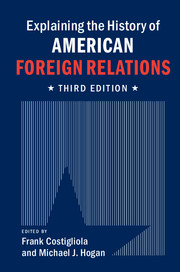Book contents
- Frontmatter
- Dedication
- Contents
- List of figures
- List of contributors
- Introduction
- 1 Theories of International Relations
- 2 National security
- 3 Corporatism: from the new era to the age of development
- 4 Explaining political economy
- 5 Diplomatic history after the big bang: using computational methods to explore the infinite archive
- 6 Development and technopolitics
- 7 Nonstate actors
- 8 Legal history as foreign relations history
- 9 Domestic politics
- 10 The global frontier: comparative history and the frontier-borderlands approach
- 11 Considering borders
- 12 The privilege of acting upon others: the middle eastern exception to anti-exceptionalist histories of the US and the world
- 13 Nationalism as an umbrella ideology
- 14 Nation Branding
- 15 Shades of sovereignty: racialized power, the United States and the world
- 16 Gendering American foreign relations
- 17 The religious turn in diplomatic history
- 18 Memory and the study of US foreign relations
- 19 The senses
- 20 Psychology
- 21 Reading for emotion
- Index
17 - The religious turn in diplomatic history
Published online by Cambridge University Press: 05 March 2016
- Frontmatter
- Dedication
- Contents
- List of figures
- List of contributors
- Introduction
- 1 Theories of International Relations
- 2 National security
- 3 Corporatism: from the new era to the age of development
- 4 Explaining political economy
- 5 Diplomatic history after the big bang: using computational methods to explore the infinite archive
- 6 Development and technopolitics
- 7 Nonstate actors
- 8 Legal history as foreign relations history
- 9 Domestic politics
- 10 The global frontier: comparative history and the frontier-borderlands approach
- 11 Considering borders
- 12 The privilege of acting upon others: the middle eastern exception to anti-exceptionalist histories of the US and the world
- 13 Nationalism as an umbrella ideology
- 14 Nation Branding
- 15 Shades of sovereignty: racialized power, the United States and the world
- 16 Gendering American foreign relations
- 17 The religious turn in diplomatic history
- 18 Memory and the study of US foreign relations
- 19 The senses
- 20 Psychology
- 21 Reading for emotion
- Index
Summary
Few aspects of the human condition are as complicated as religion. Universal and yet impossible to define because no single definition can capture its diversity and complexity, religion is a source of war and peace, conservatism and liberalism, traditionalism and modernism, nationalism and internationalism, localism and globalism. It is the producer and product of culture, and all that culture entails. Worldwide, in virtually every society, it has provided a basis for the human condition from long before the axial age right through to the present. Yet in the twenty-first century, a digital era of big data, medical miracles, and artificial intelligence, we are more conscious than ever of living in what the philosopher Charles Taylor has called “a secular age.”
For diplomatic historians, the problem of religion has been especially acute. Mostly neglected until the last decade or so, religion poses a unique set of methodological and epistemological challenges. This chapter aims to provide a historiographical overview of religion's burgeoning presence in the field; an introduction to the challenges it poses; and a set of guidelines on how it can be used effectively to explain the history of American foreign relations.
Despite its salience to virtually every time period and most topics in American history, until recently the study of religion had been relegated to the margins of historical scholarship. Instead of being considered an integral component of US history writ large, religious history had developed into a specialist subfield, thriving amongst its practitioners but with little appeal and acceptance in the wider historical community. In an influential essay in 2004, Jon Butler observed that modern American historians had a “religion problem”: they rarely utilized religious actors or subjects; when they did, it was suddenly and temporarily, with usually superficial results. Butler compared religion to a jack-in-the-box, popping up briefly and unexpectedly before disappearing with little trace. Since then, however, political, social, and cultural historians have worked hard to integrate religion into their broader narratives, so that it now has a central role in topics as diverse as civil rights, ethnicity, citizenship, deindustrialization and the emergence of a services-based economy, mass internal migration, and the rise of the conservative political movement. No longer is the historiographical presence of religion ephemeral, sudden, or brief.
- Type
- Chapter
- Information
- Explaining the History of American Foreign Relations , pp. 284 - 303Publisher: Cambridge University PressPrint publication year: 2016
- 2
- Cited by



